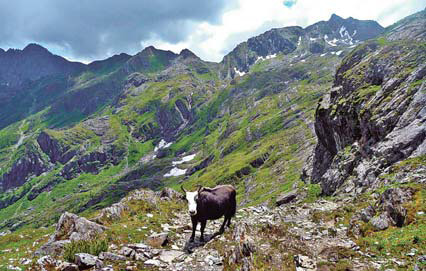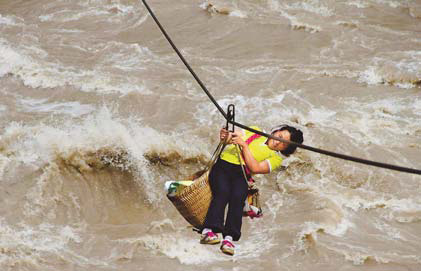Rare sightings
The next morning we set off in the rain along an ancient southwestern tea and horse route. Thousands of years of mule trains crossing the mountain range en route to India, Asia minor and onto Europe has left a slippery stone path that cuts deep into the overgrown vegetation.
 |
|
A mountain cow blocks the path down the mountain. |
Now rarely used, this was once one of the most important highways in Asia, the only year-round snow-free route into China. After four days of almost constant rain, we decided to head north along the Nujiang River out of the tropical rainforests and towards the Himalayan foothills.
At the small town of Gongshan, at the head of the northern section of Gaoligong Mountain, a sign in the window of the local tourism office informed us the area was shut off to visitors due to the heavy rains. We did a hasty re-planning and after seeing reports on the Internet of small groups of snow monkeys around the top end of the Lancang River - the Mekong river, as it is known outside of China - decided to head east.
The problem we faced was that all the rivers in the area run like fingers in parallel, coming down from Tibet in the north, with steep mountain ranges in between. The roads run along the valleys and the only way to travel from one valley to the other is to hike over the mountains by foot.
It took us three days of hard walking to traverse the mountains. The local guides were acclimatized to the altitude, but even with the help of mules to carry our backpacks, we found ourselves gasping for air as we ascended over 4,000 meters to get over the ridges.
 |
|
A villager ferries supplies along a zip wire across the Nujiang River. |
At night we camped along the rivers making sure to set up our tents before the daily evening storms that thunder down the valleys. The morning sun lit the vast snow-capped mountains that surrounded us and we scoured the trees for movement. This is spectacular scenery and well-worth the effort it takes to reach it.
On the third day we descended to Chizhong, a small village with a French built church surrounded by vineyards, a legacy of 19th century missionaries. There the road was blocked and we waited four days before making our way across to Tacheng, a small town deep in the high altitude coniferous forests of northern Yunnan where the snow monkey is most often found.
We were now into our fourth week and all our efforts to date had led to nothing. This was to be our last attempt to find the snow monkey and Chapman was getting pessimistic about the chances of finding them.
We hiked up into the tall pine trees with hanging lichens, the primary source of food for the snow monkey, and asked the people we met for information that could lead us to the animals. We had woken up to rain and cursed our luck as a deep mist descended over the hills. A local villager gave us shelter from the rain in a small wooden hut and there we learned of a massive landslide north of Gongshan in an area we would have been had we followed our initial plan.
A young man rushed in asking us to "come quick" and we hurried down a path into the forest. In the distance the trees swayed and branches cracked and then in one brief moment I had my first glance of a snow monkey jumping from one tree to another. A group of around 20 approached us and passed by on their way down a steep gully as I frantically snapped pictures praying my camera would not falter in the rain.
They paid little attention to our presence, at times coming within a few meters. One young female with spiked black hair rising above a white fur face, sat in a tree, legs apart, and watched us fiddling with our equipment. In less than 10 minutes they had gone and we let out cheers at finally seeing one of the rarest primates in the wild.
 0
0 







Go to Forum >>0 Comments